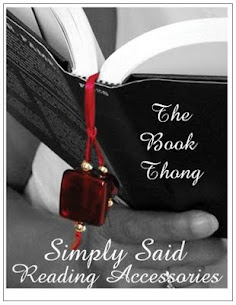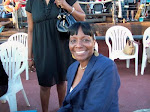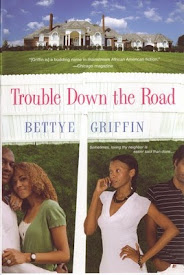Excerpt. © Reprinted by permission. All rights reserved.
I Am Charlie Wilson
Prologue
Our house was very musical, but we weren’t allowed to play the blues. That’s what my mother would call any music that wasn’t gospel—the blues. Irma Delores Wilson was saved, sanctified, and filled with the Holy Ghost, and in her mind, if you couldn’t sing a particular song loudly from the front pews of the Church of God in Christ, then, like cigarettes, alcohol, and cursing, it was a sin against the good Lord. Something that would land you on the wrong side of heaven’s gates.
Mind you, there wasn’t any such thing as black radio in Tulsa. You had one radio station back in the fifties and sixties, and that station played Frank Sinatra, Elvis Presley, the Everly Brothers, and the like, which we could listen to occasionally when we rode in the car. But if we wanted to hear R & B music—Sam Cooke, Otis Redding, the Rolling Stones, the Temptations, the Supremes—we had to go next door for that. Miss Hanna, our neighbor, had all that music in spades, sitting right there next to one of the best-sounding stereos and speaker systems in our neighborhood. Her records were shiny, too—she kept them clean and scratch-free. My brothers, my friends, and I would sneak over there and listen to Sam Cooke’s “You Send Me” and everything by Harry Belafonte. Our favorite was James Brown, a god in and of himself. He brought a whole other level of energy and soul that we could detect even at a young age. With him, you wouldn’t be satisfied sitting in your chair and tapping on the counter; he was doing something completely different from that Motown romanticism—not just lyrically but musically. Motown had a heavy backbeat on the two and the four, with a tambourine attached to it. When James punched the two and the four and the horns would hit and the snap of the snare drum pounced—it was bam! Like gunshots. It was so powerful and monstrous you couldn’t help but dance. He straightened everybody out with that funk, like, “Here I come, here I go, and here I’m going to stay.” He was the leader. I was only about eight or nine when James Brown was leaving that indelible artistic mark, and every last one of my friends and I loved him with abandon. We all tried to do the “James Brown.” His feet were so fast and the splits so badass. He had a hold on every young kid and teenager who ever dreamed of making music. That none of that was allowed in my house, where my father was a preacher and my mother a choir director, just made me love “the blues” even more.
Still, from the youngest age, I was so moved by this soul music, I wanted to share it with my parents. There was one artist whom I thought even they, especially my mother, could appreciate: Stevie Wonder. He moved something deep inside me. I’ll never forget the first time I heard Stevie Wonder at Miss Hanna’s house. He sounded like a twelve-year-old version of my mama. In fact, I thought he was a girl—rolling his voice with that same sound quality Mama had when she sang and played piano at my father’s church—until somebody told me otherwise. One day when I heard “Fingertips” on the radio, I nearly lost my mind. I ran over to Miss Hanna’s window and yelled out to my mother to listen, and then I turned the stereo up really high. She smiled, I snapped my fingers to the beat, and Stevie, well, he worked those licks and riffs that became part of his repertoire.
Nobody was making those runs on the radio.
Nobody.
Stevie was the first, and he was incredible. That he was a young boy, just a bit older than me, encouraged my already intense desire to sing. Prior to hearing Stevie, I didn’t believe that anybody could touch the performance ability I’d displayed in church and at home and had already been getting accolades for. But there he was.
“I can get him, Mama! I can get him! I can sing like that!” I yelled.
My mother laughed. And then she got serious: “Boy, you ain’t playing no blues.”
Call it what you want, a sixth sense, a gut instinct, a premonition, or simply a mother’s intuition, but Mama understood the trouble that could come with being a secular celebrity. The drinking. The drugs. The women. The jealousy and envy. The danger. The incredible rise and the dizzying plummets. The stakes were high. And she wanted to protect her son—a naïve, impressionable church boy—at any cost.
She did the best she could. I didn’t listen. My talent, this God-given gift of vocal, performance, and musical production skills, was too strong a pull. As soon as I could, I ran toward the fire. And I got burned. In part because that is the way of the music industry: it sucks you in and, if you are not careful, chews you up into bitty pieces and spits you back out into the wind. But also because, like my mother probably knew deep down in her gut, I was not naturally endowed with all the bravado you need to navigate stardom. Not in the earliest of my days in the spotlight, anyway.
My friend Rick James, whom I’d meet after my family band, The GAP Band, started making it, knew this, too. He used to tell me that I was much too quiet. Rick was boisterously charismatic, the way he walked, the way he commanded a room. When I met him in 1978 or 1979, he was already a bona fide rock star and was covering some of The GAP Band’s music in his shows. He was on the Motown label, so he had a machine in his corner. He also had the Stone City Band up there onstage with him and a fan base that got downright rabid from the moment he’d come out, shirtless, into the spotlight, the tails of his long leather coat flying behind him, his man tights and leg warmers sitting funky in his cowboy boots, and all that hair swinging past his shoulders. When his fingers got to prancing across the strings of his guitar and the audience made out the notes for the intro to “You and I” or caught wind of the opening licks to “Mary Jane,” the entire arena would combust into all kinds of screaming and shouting and frenetic energy. Rick James was electric, and he was drawn to me because I was his complement onstage—wild and full of bravado. Active. He liked that. He liked me. And pretty quickly after we met, we were fast friends, running the streets and hitting the clubs and getting into all kinds of debauchery together. But it was hard for me to keep up with Rick.
One night he had me ride in the limo with him and an entourage of about ten people as we headed for the China Club in Los Angeles. Rick was practically talking in tongues—“All you gappers and finger snappers and toe tappers and you love rappers,” that line from The GAP Band’s “I Don’t Believe You Want to Get Up and Dance (Oops!),” was just one of the jewels Rick dropped that night in the limo—and to say he was amped when it came time to walk past the velvet rope and into the doors of the China Club would be an understatement. I was by his side in the car, but by the time all the people piled out of that limo and the bodyguards started jumping out of their cars and the swag level of Rick James and his entourage was turned up to one thousand, I was all the way in the back of the line, having been shoved out of the way by Rick’s various groupies and clingers-on as they jockeyed for space in his orbit.
That’s the way I was: Vibrant onstage but quiet and unassuming off. Too afraid to speak up. Rick was a superstar. Me, I was just the lead singer in a band. “You’re too humble,” Rick said to me when we finally found each other in the VIP room after twenty minutes. I didn’t want to cause a scene or be a problem to anybody, and he wanted me to be the opposite. “You should have been right here next to me the whole time.”
“How could I do that?” I asked. “I had people pushing me out the way.”
“You gotta act like a star,” he said, tossing in a few curse words to put an exclamation mark on his point. “Watch me. I’ll show you how.”
The next day, he dressed me up in all this stuff—all that Rick James accouterment that made him bigger than life: boots and tights, leather, and leg warmers. And he had me walking around with him like that—trying to give me a different swagger. “Who are you?” he kept asking me. “I know who I am. The name is Rick James, bitch.” That was not a saying made up by Charlie Murphy and Dave Chappelle for a TV skit. Rick was really like that. That was his thing: “This is rock and roll, bitch.” He insisted I say it, but I couldn’t do it. Having been raised in a preacher’s house, I couldn’t see myself responding to someone who asked me my name with a “My name is Charlie Wilson, bitch!” So I didn’t say it, I didn’t think it, I didn’t act on it. I didn’t run through the women and call them bitches. I just let Rick act on it. And that was okay for a minute, but after a while, I started feeling less than—as if I were the clinger-on and everyone else was the superstar. I felt little. Belittled. Rick, Sly, Stevie Wonder, all the superstars I hung with had everything, and there I was with so little self-esteem. I felt as if I were a nothing, had nothing. Then soon enough, that nothing manifested for real.
Low self-esteem was the bitch.
And ultimately, the catalyst for my spectacular downfall.
Singing the blues didn’t kill me after all. Music, my gift, helped me to soar, dropped me to my lowest of lows, and resurrected me in ways immeasurable. In fact, it, along with God’s goodness and mercy, imprinted on me as a child raised by the hand of a woman who loved and revered the Lord, saved my life.
Simply Said Says...
I have always loved memoirs because they tell you the back story of who they are and how they came to be so successful. Charlie Wilson has been singing over half his lifetime, from a child he knew what he wanted to do and be. His collaborations with artists from The Rolling Stones to Snoop Dogg show his longevity and versatility in this career. He drops so much wisdom from his own hindsight as he reflects on his life, career, drugs, homelessness, his health and the legacy he is still building. And still going strong and better than ever.
I’ve loved his distinct voice since the Gap Band days, but I’m really loving this man’s voice telling his story, and he is still Outstanding!
About the Author
Charlie Wilson is an American R&B/soul music legend who has been nominated for seven Grammy Awards, including Best R&B Album for “Uncle Charlie” and Best Male R&B Vocal Performance for “There Goes My Baby.” Sober for nineteen years, Wilson signed with Jive in 2004 after landing his first No. 1 Billboard Urban AC hit in 2000, “Without You.” Wilson averages seventy-five to one hundred shows a year between concert tours, festivals, and private events, while also devoting his time to charity work as a spokesperson for the Prostate Cancer Foundation. He lives in Los Angeles with his wife.

 Can one night lead to forever?
Kassidy Monroe has spent far too many nights alone. But could she actually go through with a one-night stand? No! At least, that’s her answer until her eyes settle on him—tall, dark, and ultra-mysterious behind a black and platinum mask that makes him even more appealing. It’s lust at first sight, but how far is she willing to go with a man she’s just met?
Jaxon Prescott has always gone after what he wants. And he wants her—the sexy vixen in the feather mask. Something about her calls to him, and he’s all too willing to answer. An invitation to his hotel suite was supposed to be for a night she wouldn’t soon forget, but somehow the tables turn. He never imagines he’d be the one constantly reliving their time together.
One need. One night. One unforeseen outcome.
Can one night lead to forever?
Kassidy Monroe has spent far too many nights alone. But could she actually go through with a one-night stand? No! At least, that’s her answer until her eyes settle on him—tall, dark, and ultra-mysterious behind a black and platinum mask that makes him even more appealing. It’s lust at first sight, but how far is she willing to go with a man she’s just met?
Jaxon Prescott has always gone after what he wants. And he wants her—the sexy vixen in the feather mask. Something about her calls to him, and he’s all too willing to answer. An invitation to his hotel suite was supposed to be for a night she wouldn’t soon forget, but somehow the tables turn. He never imagines he’d be the one constantly reliving their time together.
One need. One night. One unforeseen outcome.
 Joy Avery is a contemporary romance author who loves watching her imaginary friends fall in love. When not crafting her next love story, she enjoys reading, spending time with the family, playing with her two dogs, and cake decorating.
She’s the author of the novels Smoke in the Citi, His Until Sunrise (book 1 in the Indigo Falls series), Cupid’s Error-a Valentine’s novella, and His Ultimate Desire (book 2 in the Indigo Falls series).
Joy Avery is a contemporary romance author who loves watching her imaginary friends fall in love. When not crafting her next love story, she enjoys reading, spending time with the family, playing with her two dogs, and cake decorating.
She’s the author of the novels Smoke in the Citi, His Until Sunrise (book 1 in the Indigo Falls series), Cupid’s Error-a Valentine’s novella, and His Ultimate Desire (book 2 in the Indigo Falls series).







































